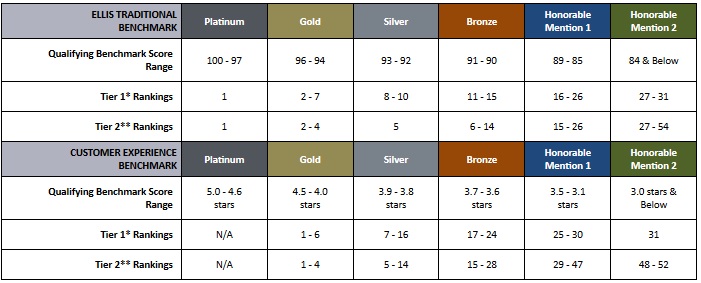Third Quarter 2018 Benchmark Results for Mystery Shops and Resident Surveys Executive Summary
For more than three decades, Ellis, Partners in Management Solutions has specialized in helping the multifamily industry achieve their business goals. We offer a turn-key integrated customer experience program, backed by our outstanding customer service, sophisticated technology, and ethical business practices. Today, our mystery shops, resident surveys, and training are resources that can be used independently to address specific needs or together for ongoing employee performance optimization. We believe the more you know about your customers and what they have to say about your people, product, and services, the better you can respond to and predict their needs. As a result, the more successful you will be at cultivating loyal customers who invest more, stay longer, and refer friends and family. Since 1984, our unchanging goal has been to help you achieve yours.
As we delve into our 2018 theme: “Developing the Outstanding Employee Into a Leader”, we are covering four teachable skills that can be developed in your future leaders: Wearing Multiple Hats, Decision Making and Problem Solving, Conflict Management Skills, and Dealing with Change. In this letter we focus on Conflict Management Skills.
We thank you for joining us each quarter as we convey combined Benchmark results and sales trends and offer practical improvement ideas.
Third Quarter 2018 Benchmark: Overall Results
Mystery Shops
Ellis benchmarks mystery shop performance on the 10 key Benchmark questions and the Customer Experience. Companies can qualify for platinum, gold, silver, or bronze level based on their company’s overall Benchmark score for the quarter.
In 2017, the overall average Ellis Traditional Multifamily Industry Benchmark score across Ellis’ entire database of eligible shops1 was 85%, representing 43,606 shops, and carries through at 85% in the Third Quarter 2018, representing 11,231 shops. In 2017, the overall average Ellis Customer Experience Benchmark score was 3.6 and remains steady at 3.6 for the Third Quarter 2018.

* Tier 1 = 70 or more shops
** Tier 2 = 30-69 shops
Resident Surveys
The Ellis Loyalty Benchmark identifies and recognizes the customer experience performance of companies subscribed to the Ellis Resident Surveys Program. It evaluates performance on 5 key touchpoints of the prospect and resident journey. The percentage of surveys responded to by the onsite team and the average number of days it took for the team to respond are also measured because these two factors impact the customer relationship and overall loyalty. Utilizing customer loyalty as a metric allows customer-centric companies the ability to forecast three specific customer behaviors: likelihood to convert/renew, willingness to pay more, and likelihood to recommend.
Ellis’ customer loyalty score is based on a scale of 0%-100% (see chart below):

The overall average Ellis Loyalty Benchmark score in 2017 was 74%, compared to 75% for Third Quarter 2018. In 2017, the onsite response rate averaged 87%; Third Quarter 2018 reflects an increase to 89%. Teams took an average of 5.2 days to respond in the Third Quarter 2018 versus an average of 6.3 days in 2017.

CONGRATULATIONS TO ELLIS BENCHMARK’S TOP PERFORMING COMPANIES THIRD QUARTER 2018
Mystery Shops
Ellis Traditional Benchmark Platinum Level Achievers
Tier 1 (70 or more completed shops)
- Western National Property Management
Tier 2 (30-69 completed shops)
- Legacy Partners Residential, Inc.
Ellis Customer Experience Benchmark Gold Level Achievers
Tier 1 (70 or more completed shops)
- AMLI Residential
- Cortland Partners
- CWS Apartment Homes, LLC
- Irvine Company Apartment Communities
- Mill Creek Residential Trust
- Windsor Property Management Co / GID
Tier 2 (30 – 69 completed shops)
- Legacy Partners Residential, Inc.
- Matrix Residential
- Richman Property Services, Inc.
- Wood Partners
Resident Surveys
Ellis Best in Class Achievers
Tier 1 (1600 or more surveys received)
- Affinity Property Management
- Block Multifamily Group, LLC
- CWS Apartment Homes, LLC
- Fore Property Company
- FPI Management
- Guardian Management, LLC
- Landmark Communities
- Lincoln Property Company
- LMC, a Lennar Company
- Manco Abbott
- Middleburg Management, LLC.
- Provence Real Estate, LLC
- Simpson Property Group
- The Tomanek Group
- TriBridge Residential
- Zaremba Management Company
Tier 2 (1599 or fewer surveys received)
- Carlisle Property Management (CPM)
- HRI Properties
- Longboat Enterprises
- Mack Urban Communities
- PVGV Management
- ResideBPG
- Reybold Venture Group
- Sunrise Management & Consulting
- TM Realty Services
*Companies are listed in alphabetical order
**Customer Experience Benchmark gold level achievers are recognized as there were no platinum achievers for this period
ELLIS’ THIRD QUARTER 2018 BENCHMARK: QUESTION/TOUCHPOINT RESULTS
Mystery Shops
How did we do?
The chart below reflects the average score of Ellis’ entire database of eligible shops1 for each of the 10 key benchmark questions and the Customer Experience by category, as well as the combined overall Benchmark scores for Third Quarter 2018.


Resident Surveys
The chart below reflects the average scores across all Ellis Resident Survey companies for each survey touch point for Third Quarter 2018, as well as the combined overall loyalty score and average accountability performance results.

Developing the Outstanding Employee into a Leader – Part III: Conflict Management
Leadership is a full-contact sport. It is designed for those who are willing to jump in the ring and address conflict fairly and productively. But, where is conflict born? Just about everything and anything can create conflict in the workplace: competition, disagreements, power struggles, jealousy, ego, poor performance, contrasting personalities, compensation issues, moodiness, and more. Ironically, the issue itself often does not cause the problem, but instead the conflict arises as a result of poor communication or the inability to control one’s emotions. The bad news is that workplace conflict is unavoidable. The good news is that a resolution can be found if the manager recognizes the conflict, understands the nature of the conflict, and is able to bring a timely resolution to it or at the very least manage it. This need to demonstrate conflict management skills on the job is reflected in a workplace conflict study of over 5,000 employees completed by Consulting Psychologists Press (CPP):
- The average American worker spends 2.8 hours a week dealing with conflict in the office.”
- Chronic unresolved conflict” in the office is the deciding factor in 50% of cases where an employee chooses to leave his job, and is of one the primary causes cited in 90% of terminations.
- 42% of employees felt that their employers needed to do a better job of addressing conflict in the workplace.
Developing the outstanding employee into a leader will require teaching them when and how to seize the opportunity to resolve the conflict before healthy tension turns into disruptive pandemonium in the leasing office.
1. Timing is of the Essence
Timing is everything when it comes to resolving a conflict. Managers should always be on the lookout for conflict or potential conflict. Keeping communication lines open with the team and having an open-door policy is a great way to get ahead of problems. But careful consideration should also be given before acting on a conflict. Ernest Agyemang Yeboah, a writer and teacher, expressed the idea of timing well: “Don’t rush, just because you have reasons! Reason with the reasons and take definite action in the right direction, in haste, where needed, or with patience, where it is essential to do so! Mind your thought and think about your action!” Some feelings of anger or hurt usually accompany conflict situations, and managers must present the opportunity for the emotions of the conflict to be released and acknowledged. This should take place before addressing the conflict. Allowing an employee to “clear the air” will help them channel their focus to the situation at hand. For many managers, it is very tempting to wait for a conflict to blow over by itself, but it rarely does. In most cases it only gets worse with time. According to the previously referenced CPP study, the most common reason that conflicts at work escalate is because nobody does anything. Remember, careful consideration is one thing and inaction is altogether something different. If managers wait too long during times of adversity, they will lose respect from their subordinates and their leadership momentum will suffer.
2. Soft Skills Matter
In a Washington Post article Joyce E. A. Russell, the director of the Executive Coaching and Leadership Development Programs at the University of Maryland, expressed: “In today’s highly competitive world, it is often the softer skills that differentiate applicants and determine who will get hired, who will be successful, and who will move up in the organization.” Russell insists soft skills like collaboration, conflict management, and negotiation skills are vital. Dealing with conflict can be emotionally exhausting, and it is not the easiest task. It requires a calm, planned approach versus an emotional knee-jerk reaction. Here are a few ways a manager can practice soft skills in the leasing office:
- Surface the goal by asking questions. Dealing with conflict can be messy. When you surface the goal, you are presenting where you want the situation to end. Statements such as, “What would you offer to do or change to help resolve this issue,” “What would you like in return,” or “I want to identify some team-building activities that will strengthen our relationships,” or when things get out of hand, “I want to know how we can improve the communication between you and X.” These are just a few opening statements which can help a manager stay focused on the goal rather than the conflict. Recognize that there is no objective reality in most conflict situations. Everyone perceives issues differently, but there will be concrete things that happened or did not happen, and there should be a clear goal. By asking questions, the manager can better understand the issue, bridge the gap, and encourage each person in the conflict to see things from the other person’s perspective.
- Address the issue privately. Unfortunately, many conflicts make it through the office a few times before they are addressed privately. Gossip can run rampant through an office, and it can quickly distract a team, destroy trust, and damage overall morale. Conflicts should be addressed privately, in a timely manner, and only with the parties involved.
- Be a clear communicator and active listener. It is important to communicate with those who are involved in the conflict in a clear, direct, and concise manner in order to reduce any ambiguity which could arise. Any barriers or misunderstandings can quickly create a wide gap in understanding which can result in confusion, resentment, and disappointment. Active listening has also been widely recognized as one of the most important tools of conflict resolution. If managers can dedicate themselves to active listening, they will significantly increase their ability to understand the other side. When they understand the other’s point of view in the conflict, they can begin to resolve it.
3. Strategy is Key
Typical workplace conflicts can range from minuscule to enormous in size. Some can be diffused with a short and simple conversation while others might require a more complex approach. The Thomas-Kilmann’s conflict mode instrument (TKI) identifies five common strategies for dealing with conflict: competitive, collaborative, compromising, accommodating, and avoiding. It organizes the 5 conflict management styles based on two dimensions: assertiveness and cooperativeness. Managers should be aware of their natural default pattern and realize that each conflict situation requires a strategic approach which might require them to step out of their comfort zone. If they only operate in their “comfort mode,” resolving workplace conflicts will be difficult. Consider your own default approach to conflict. Are some approaches easier than others? The answer is probably yes. If we were to attach goals to each of the 5 styles, they might look something like this:
- Competitive: I win, you lose.
- Collaborative: I win, you win.
- Compromising: I win some, you win some.
- Accommodating: I lose, you win.
- Avoiding: I lose, you lose.
Although the above approaches each have their time and place, managers need to ask themselves, “Is my preferred conflict handling style the very best I can use to resolve this specific conflict or solve this particular problem?” If the answer is no, they need to consider a new strategy.
As you can see, dealing with conflict is not a simple or easy process. The best way for a manager to increase their knowledge of and skill in dealing with conflict is through experience. New managers should be given the proper tools and training to achieve success as quickly as possible. Most importantly, they must rise above the conflict while they develop a well-planned, timely, strategic approach to help resolve it. General Douglas MacArthur said it well: “A true leader has the confidence to stand alone, the courage to make tough decisions, and the compassion to listen to the needs of others. He does not set out to be a leader but becomes one by the equality of his actions and the integrity of his intent.” In conflicts, teach your managers to keep a level head, weigh their options, and then get down to work. It really is as simple as that. With a few years’ experience under their belts, they will realize that conflict resolution is rarely black and white and that it presents a unique opportunity for professional growth and development.
We thank you for your ongoing participation and feedback, which help make this report informative, fresh, and a reliable resource. We hope you will find Ellis Partners in Management Solutions to be not only the finest source for mystery shopping and resident surveys but also a training resource (including our partner Edge2Learn) for your organization. Additional support and information can be found on our website.
October 31, 2018
Prepared by Joanna Ellis, Chief Executive Officer and Francis Chow, Chief Strategic Officer
Footnotes: 1 See Ellis website for Benchmark eligibility, tier level, and recognition requirements for mystery shops and resident surveys.

